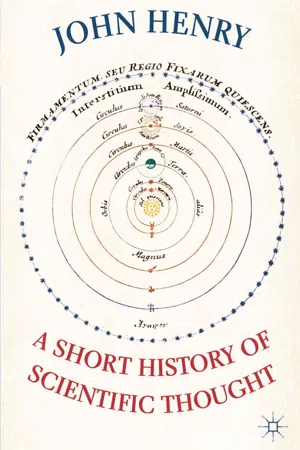
- 328 pages
- English
- PDF
- Available on iOS & Android
eBook - PDF
A Short History of Scientific Thought
About this book
An essential introductory textbook that shows students how science came to be such an important aspect of modern culture. Lively and readable, it provides a rich historical survey of the major developments in scientific thought, from the Ancient Greeks to the twentieth century. John Henry also explains how new scientific theories have emerged and analyses their impact on contemporary thinking.
This is an ideal core text for modules on the History of Science, Medicine and Technology, or the History and Philosophy of Science - or a supplementary text for broader modules on European History or Intellectual History - which may be offered at the upper levels of an undergraduate History, Philosophy or Science degree. In addition it is a crucial resource for students who may be studying the history of science for the first time as part of a taught postgraduate degree in European History, Intellectual History, Science or Philosophy.
This is an ideal core text for modules on the History of Science, Medicine and Technology, or the History and Philosophy of Science - or a supplementary text for broader modules on European History or Intellectual History - which may be offered at the upper levels of an undergraduate History, Philosophy or Science degree. In addition it is a crucial resource for students who may be studying the history of science for the first time as part of a taught postgraduate degree in European History, Intellectual History, Science or Philosophy.
Frequently asked questions
Yes, you can cancel anytime from the Subscription tab in your account settings on the Perlego website. Your subscription will stay active until the end of your current billing period. Learn how to cancel your subscription.
No, books cannot be downloaded as external files, such as PDFs, for use outside of Perlego. However, you can download books within the Perlego app for offline reading on mobile or tablet. Learn more here.
Perlego offers two plans: Essential and Complete
- Essential is ideal for learners and professionals who enjoy exploring a wide range of subjects. Access the Essential Library with 800,000+ trusted titles and best-sellers across business, personal growth, and the humanities. Includes unlimited reading time and Standard Read Aloud voice.
- Complete: Perfect for advanced learners and researchers needing full, unrestricted access. Unlock 1.4M+ books across hundreds of subjects, including academic and specialized titles. The Complete Plan also includes advanced features like Premium Read Aloud and Research Assistant.
We are an online textbook subscription service, where you can get access to an entire online library for less than the price of a single book per month. With over 1 million books across 1000+ topics, we’ve got you covered! Learn more here.
Look out for the read-aloud symbol on your next book to see if you can listen to it. The read-aloud tool reads text aloud for you, highlighting the text as it is being read. You can pause it, speed it up and slow it down. Learn more here.
Yes! You can use the Perlego app on both iOS or Android devices to read anytime, anywhere — even offline. Perfect for commutes or when you’re on the go.
Please note we cannot support devices running on iOS 13 and Android 7 or earlier. Learn more about using the app.
Please note we cannot support devices running on iOS 13 and Android 7 or earlier. Learn more about using the app.
Yes, you can access A Short History of Scientific Thought by John Henry in PDF and/or ePUB format, as well as other popular books in History & Science History. We have over one million books available in our catalogue for you to explore.
Information
Table of contents
- Cover
- Half Title
- Title
- Copyright
- Dedication
- Contents
- List of Boxes, Figures and Tables
- Acknowledgements
- Introduction
- 1 Setting the Scene: Natural Philosophy in Ancient Greece
- 2 Plato and Aristotle
- 3 From the Roman Empire to the Empire of Islam
- 4 The Western Middle Ages
- 5 The Renaissance
- 6 Nicholas Copernicus and a New World
- 7 New Methods of Science
- 8 Bringing Mathematics and Natural Philosophy Together: Johannes Kepler
- 9 Mathematics and Mechanics: Galileo Galilei
- 10 Practice and Theory in Renaissance Medicine: William Harvey and the Circulation of the Blood
- 11 The Spirit of System: René Descartes and the Mechanical Philosophy
- 12 The Royal Society and Experimental Philosophy
- 13 Experiment, Mathematics, and Magic: Isaac Newton
- 14 The Newtonian Enlightenment
- 15 The Chemical Revolution: Priestley and Lavoisier; John Dalton and Beyond
- 16 Newtonian Optimism: Natural Theology and Natural Order
- 17 The Making of Geology: From James Hutton to Charles Lyell
- 18 The History of Plants and Animals: Successive Emergence or Evolution?
- 19 Religion and Progress in Victorian Britain: Robert Chambers versus Hugh Miller
- 20 Bringing it All Together? Charles Darwin’s Evolution
- 21 Darwinian Aftermaths: Religion; Social Science; Biology
- 22 Beyond Newton: Energy and Thermodynamics
- 23 Newton Deposed: Einstein and Relativity Theory
- 24 Mathematics Instead of a World Picture: From Atomism to Quantum Theory
- Afterword
- Index